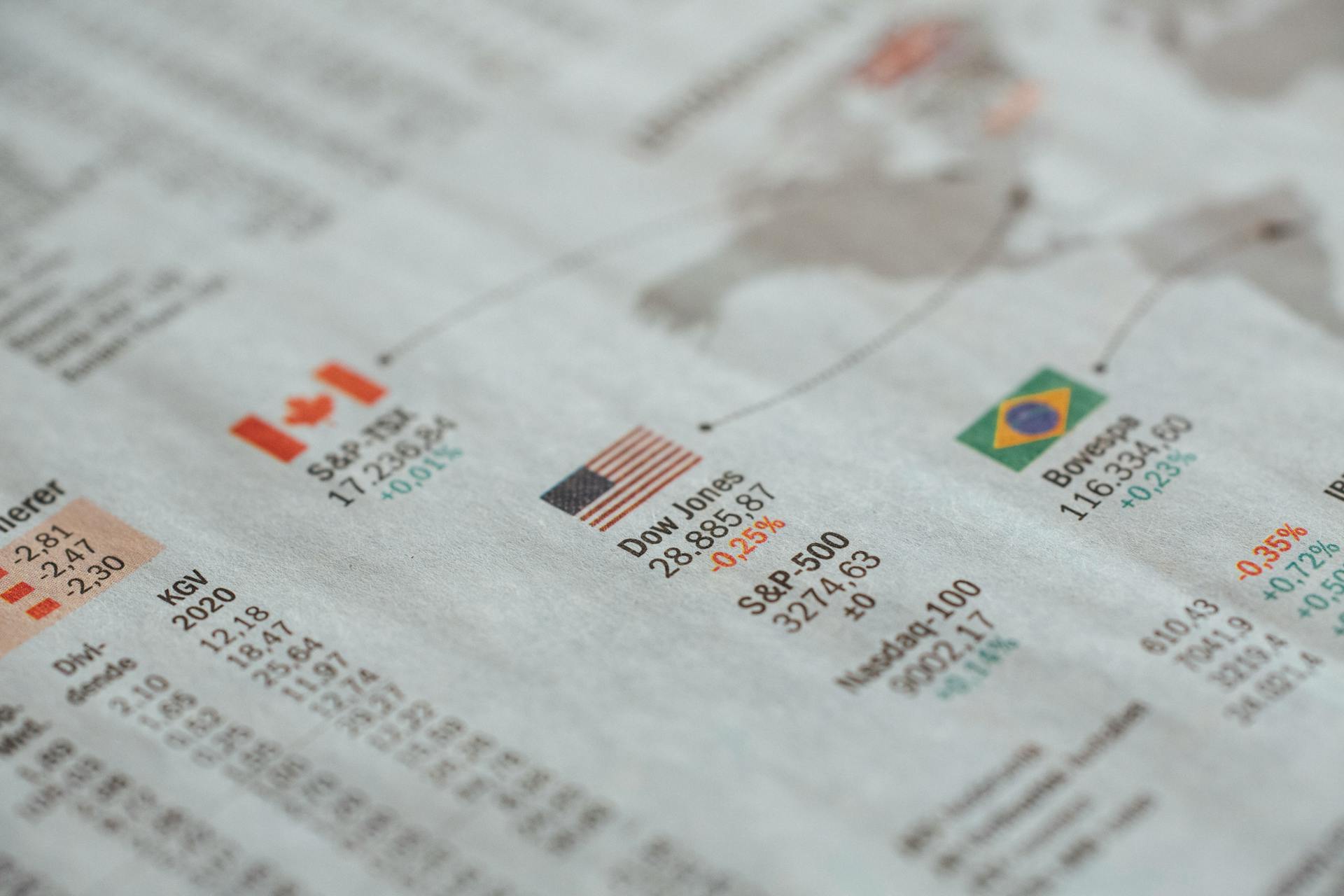
A futures contract is a standardized agreement to buy or sell an asset at a predetermined price on a specific date. This contract is traded on a public exchange, such as the Chicago Mercantile Exchange.
The exchange sets the rules and regulations for trading futures contracts, including the size of the contract and the delivery months available. For example, a futures contract for gold might be 100 ounces and available for delivery in March, June, September, or December.
Forward contracts, on the other hand, are customized agreements between two parties to buy or sell an asset at a predetermined price on a specific date. These contracts are not traded on a public exchange and are often used for large, one-time transactions.
A different take: How Do You Buy Gold Futures
What Are Derivatives?
Derivatives are financial instruments that get their value from the price of something else. This means that the value of a derivative is based on the predetermined and current price of the underlying asset.
There are three main varieties of derivatives: forward contracts, futures contracts, and option contracts. These varieties are the building blocks of derivatives.
A forward contract is a type of derivative that allows two parties to agree on a price for a specific asset at a future date. The value of a forward contract is based on the predetermined price of the asset.
Futures contracts are similar to forward contracts, but they are traded on an exchange and have standardized terms. The value of a futures contract is also based on the predetermined price of the asset.
Option contracts give the buyer the right, but not the obligation, to buy or sell an asset at a predetermined price. The value of an option contract is based on the current price of the asset and the strike price of the option.
Here's a quick rundown of the three main varieties of derivatives:
Types of Derivatives
A derivative is a contract between two parties that derives its value from an underlying asset. There are two main types of derivatives, and I want to highlight the key differences between them.
In the context of forward contracts, we have two types: outright forward contracts and non-deliverable forwards (NDFs). Outright forward contracts allow for the physical delivery of the underlying asset, whereas NDFs do not.
Here are the two types of derivatives in a concise list:
- Outright forward contracts
- Non-deliverable forwards (NDFs)
For example, in a forward contract, the terms of the contract call for the producer to deliver a certain quantity of potatoes at a fixed price. This is in contrast to NDFs, where no physical delivery takes place.
Types of Derivatives
Forward contracts are a type of derivative that allows parties to agree on a price for an asset at a future date. This type of contract is used to reduce market risk, as seen in the example of Joe and ACME Corporation.
In a forward contract, no money or assets change hands during the signing of the contract. Instead, the parties agree on a delivery price and a specific quantity of the underlying asset. For instance, Joe and ACME Corporation agreed on a delivery price of 50 cents per pound for 2 tons of potatoes.
The underlying asset is a key component of a forward contract, and it can be any commodity, such as potatoes. The delivery price, also known as the forward price, is the price at which the asset will be delivered at a future date. In the case of Joe and ACME Corporation, the delivery price was 50 cents per pound.
Forward contracts can be used for physical delivery or cash settlement, but in the example provided, the contract called for physical delivery of 2 tons of potatoes. This means that Joe must deliver the potatoes to ACME Corporation at the agreed-upon price.
Here are some key characteristics of forward contracts:
- Underlying asset: potatoes
- Delivery price: 50 cents per pound
- Quantity: 2 tons
Each forward contract is unique to the terms of the contract, and products are not standardized. This means that each contract must be tailored to the specific needs of the parties involved.
Futures Contract
A Futures Contract is a type of derivative that allows you to buy or sell an asset at a set price on a specific date in the future. This is often used by investors to hedge against potential losses or to speculate on price movements.
The key feature of a Futures Contract is that it's standardized, meaning the terms of the contract, such as the quantity and quality of the asset, are predetermined. This standardization makes it easier to trade and settle these contracts.
Futures Contracts are traded on exchanges, such as the Chicago Mercantile Exchange (CME), and are typically settled in cash, rather than physical delivery of the asset. This is because the actual delivery of the asset is often impractical or unnecessary.
Risks and Costs
Risks and costs are a crucial part of any financial agreement. Forward contracts, in particular, come with a significant risk of default by one party failing to deliver their part of the deal.
Problems can also arise due to market conditions, making it more likely for one party to default. An increase in the underlying price of potatoes, for example, can be an incentive for Joe to default and seek another buyer.
There are upfront costs to trade futures, but not with forward contracts. You need to have a certain amount of cash in your account to execute trades, but with forward contracts, all you need is to agree on the price.
If you're the buyer, this can be great, but if you're the seller, you better have a plan B in case the buyer flakes out. Westinghouse Electric Corporation, for instance, had to deal with the consequences of defaulting on a forward contract in 1975, citing legal reasons.
Counter-Party Risk
Counter-Party Risk is a significant concern when dealing with forward contracts. It's the risk that one party will fail to deliver their part of the deal, as seen in the example of Joe failing to meet the agreed quota of 2 tons of potatoes.
The Westinghouse Electric Corporation case in 1975 is a well-documented example of a company defaulting on a forward contract, citing legal reasons. This highlights the potential consequences of defaulting on a forward contract.
A key difference between forward contracts and futures contracts is that futures contracts have a lower counter-party risk. This is because the exchange takes on the counter-party risk in futures contracts, whereas in forward contracts, there is a higher level of counter-party risk.
To mitigate counter-party risk, it's essential to ensure the terms of the deal and the person you are trading with have "skin in the game." This means that they have a vested interest in delivering on the goods or cash, as there are no assets exchanged hands when signing the deal.
The potential opportunity costs of waiting 90 days on a deal, only to have it fall through, can be significant. This is why it's crucial to carefully assess the counter-party risk before entering into a forward contract.
Upfront Costs
Upfront Costs can be a significant consideration when deciding between futures and forward contracts.
Futures trading requires a performance bond and maintenance margin, which can be substantial depending on the exchange and brokerage firm.

These financial obligations must be met to execute trades, and failing to do so can lead to an inactive account status.
No upfront costs are associated with forward contracts, making them a more accessible option for buyers.
However, buyers who fail to meet their obligations can leave sellers in a difficult position, highlighting the importance of having a plan B.
Advantages and Disadvantages
The advantages of considering risks and costs can be significant. By understanding the potential downsides, you can make more informed decisions and avoid costly mistakes.
One major advantage is that it can help you avoid financial losses. For example, a study found that companies that ignored risk assessments ended up losing an average of $1.4 million.
Being aware of risks can also give you a competitive edge. As mentioned earlier, a company that prioritized risk management was able to reduce its losses by 30%.
However, there are also some disadvantages to consider. One major drawback is that risk assessments can be time-consuming and costly to conduct.

Despite this, the benefits often outweigh the costs. In fact, a survey found that 80% of companies that invested in risk management reported a positive return on investment.
It's also worth noting that ignoring risks can have serious consequences. For instance, a company that failed to address a known risk ended up facing a $10 million lawsuit.
Regulation and Trading
The Commodities and Futures Trading Commission regulates futures trading, ensuring trade transparency and protecting money from fraudulent activity.
There are no exchange regulations for futures contracts vs forward contracts, which increases risks due to the lack of liquidity.
Many forward contract deals take place across country lines, making it a tricky situation to seek justice if anything goes wrong.
Exchange Traded
Futures trading is regulated by the Commodities and Futures Trading Commission, ensuring trade transparency.
This regulation is a must-have to protect your money from fraudulent activity. The lack of regulation for forward contracts, on the other hand, opens up more risks due to the lack of liquidity.
There are no definitive studies on the number of forward contract scams, likely due to the fact that many deals take place across country lines, making it a tricky situation to seek justice.
When to Trade

If you're looking to hedge specific risks or deal with non-standardized commodities, a forward contract is a good choice. Forwards offer the flexibility to create customized agreements that meet your unique needs.
A forward contract is also a good option if you value your privacy. You can negotiate the terms of the contract without having to disclose your intentions to anyone.
In contrast, futures contracts are ideal for standardized and transparent markets. They offer liquidity and ease of access, making them suitable for speculation or hedging.
Regulatory oversight is also a benefit of futures contracts. This added layer of protection gives you confidence in the market and helps to prevent potential scams.
Choosing Between Options
Consider your objectives, because the intended purpose of the contract will help you decide between futures and forward contracts. If you're looking to hedge very specific risks or deal with a particular exposure, a forward contract might be the way to go.
Forward contracts are private agreements between two parties, which means there's a risk that one party may not fulfill their obligations. This is known as counterparty risk, and it's a major consideration when choosing between forwards and futures.
Futures contracts, on the other hand, are traded in centralized exchanges, and the clearing house acts as a guarantor for both parties. This drastically reduces the risk of default, making futures a more attractive option for those who want to minimize counterparty risk.
Market conditions also play a role in choosing between forwards and futures. If you're trading in a volatile market, futures contracts may provide more opportunities to readjust positions and actively manage risk. However, if you're looking for stable, predictable outcomes, a forward contract might be a better fit.
Here are some key differences between forwards and futures:
Ultimately, the choice between a forward contract and a futures contract will depend on your specific needs and circumstances. Take the time to carefully consider your objectives, assess counterparty risk, and evaluate market conditions before making a decision.
Sources
- https://online.hbs.edu/blog/post/understanding-financial-derivatives-forwards-futures-options
- https://www.tradingsim.com/blog/5-key-differences-between-futures-and-forward-contracts
- https://legittai.com/blog/forward-contracts-vs-futures-contracts
- https://www.investopedia.com/ask/answers/06/forwardsandfutures.asp
- https://corporatefinanceinstitute.com/resources/derivatives/futures-forwards/
Featured Images: pexels.com


